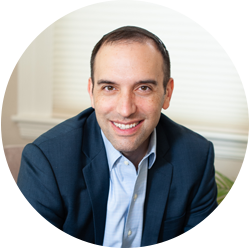Shalom Chaverim,
Earlier this week, we marked Rosh Chodesh Kislev, the first day of the Jewish month of Kislev. It is the month with the shortest, darkest days of the year and it is the month in which Hanukkah, the Festival of Lights, will remind us that we can see and create light in that darkness.
Rosh Chodesh itself reminds us of creativity. The word for “month” in Hebrew, chodesh, comes from the same root letters as the Hebrew word for “new,” chadash. Each month, we bear witness both to the moon and the cycles of nature renewing themselves, as well as to our human capacity to innovate and to create positive change in the world.
It was a particularly appropriate week to celebrate the powerful ways that we as a community are investing in and developing the vibrancy, dynamism, and creativity of Jewish arts and culture here in Greater Boston.
Yesterday, I had the privilege of filming a Hanukkah blessing for an upcoming virtual celebration together with my inspiring colleagues from the Jewish Arts Collaborative (JArts), the Museum of Fine Arts, and the Israeli Consulate. While it won’t be the same as being in person at the museum with thousands of you as we have for the past many years, I look forward to “being together” for what promises to be a meaningful and engaging celebration of both Hanukkah and the arts for the whole family.
This week, I also attended a deeply moving and energizing panel about the future of Jewish arts and culture here in Greater Boston and around the world. Over the past year, in an effort to broaden and deepen our support for arts and culture, CJP announced a grant pool to support local artists and, in partnership with JArts, our first-ever Community Creative Fellowship. Lou Cove, a Boston native and founder of Canvas, a funding collaborative dedicated to promoting a 21st-century Jewish cultural renaissance, elegantly described the power of this fellowship: “When we support Jewish creatives, we are supporting people who reflect our humanity back to us, who promote cross-cultural understanding, who offer new ways of expressing Jewish identity, who make everything else we do more beautiful.”
At a time during this pandemic when the arts in general and professional artists across this country are really struggling, here in Boston we are not only responding to our most urgent, basic human needs, but also continuing to adapt, innovate, and invest in a renaissance of Jewish life and expression that will power and inspire our community for generations to come.
One local artist who recently received a grant from CJP based a new work on Holocaust testimony. She choreographed and performed a modern dance that she filmed at the New England Holocaust Memorial.
Watching the video brought tears to my eyes as the dancers used their bodies to physically enact the words and experiences of the testimonial. It was a powerful example of how Jewish art is a form of modern midrash (traditional rabbinic commentary) — a new way of telling our people’s story and a 21st-century voice in a thousands-year-old conversation about Jewish wisdom, values, and identity.
A thriving and generative Jewish community moves from continuity to creativity, ensuring that our generation and future generations both learn the conversations of the past and write the conversations of the future. A diverse and inclusive Jewish community recognizes that, while our hyper-verbal culture can be limiting and exclusive, arts and culture expand ways for people to connect to Judaism and the Jewish community and broaden the forms of expression by which people can contribute their voices.
Of course, Jewish arts and culture is also about the human journey, as the arts are a powerful, cross-cultural tool for exploring shared, timeless human questions and making meaning of our place in this world. Rabbi Abraham Isaac Kook, himself a Jewish poet and mystic, is reported to have said:
“Literature, painting, and sculpting are able to bring to fruition all the spiritual concepts engraved in the depths of the human spirit, and so long as one brush is missing, which is stored away in the depths of the spirit — which ponders and feels — but has not been realized, there is still an obligation on the purposeful work to realize it.”
I am so proud that, even as we respond boldly to health, economic, social, and political crises, our community is also lighting the way with this purposeful work, creating Jewish communities and culture that invite and enable all of us to ponder, feel, and bring the depths of our human spirit to fruition.
Shabbat shalom,
Rabbi Marc Baker

About the Author
CJP President and CEO Rabbi Marc Baker is an educator, writer, and leadership mentor who is devoting his life to Jewish learning and building Jewish communities.
